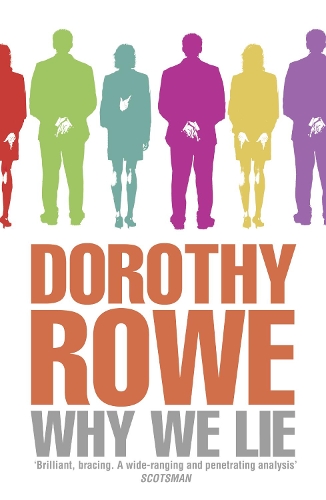
Why We Lie: The Source of our Disasters
(Paperback)
Publishing Details
Why We Lie: The Source of our Disasters
By (Author) Dorothy Rowe
HarperCollins Publishers
Fourth Estate Ltd
1st February 2011
United Kingdom
Classifications
General
Non Fiction
158.2
Physical Properties
Paperback
384
Width 129mm, Height 198mm, Spine 23mm
270g
Description
Why do we lie
Because we are frightened of being humiliated, being treated like an object, being rejected, losing control of things, and, most of all, we are frightened of uncertainty. Often we get our lies in before any of these things can happen. We lie to maintain our vanity. We lie when we call our fantasies the truth. Lying is much easier than searching for the truth and accepting it, no matter how inconvenient it is. We lie to others, and, even worse, we lie to ourselves.
In both private and public life, we damage ourselves with our lies, and we damage other people. Lies destroy mutual trust, and fragment our sense of who we are.
Lies have played a major part in climate change and the global economic crisis. Fearing to change how they live, many people prefer to continue lying rather than acknowledge that we are facing a very uncertain but undoubtedly unpleasant future unless we learn how to prefer the truths of the real world in which we live rather than the comforting lies that ultimately betray us. We are capable of changing, but will we choose to do this
Reviews
Rowe asks why we tell lies and puts the answer down to a mixture of vanity and terror.all pretty toxic, as far as personal relationships are concerned, but Rowe goes further: our failure to tell the truth is behind all manner of ills, from the current economic crisis to global warmingscary stuff, but Rowe is so wise that you begin to think it might be possible to change Guardian
'Rowe has a clear, easy style[she] is accurate in her perceptions, and persuasive in her presentation of themshe paints a nuanced picture of why lying is always dangerous, and why we should cultivate an attitude of considered scepticism' TLS
'Her analysis is gripping, astute and incisiveparts of this book are hilarious' FT
[A] seer with qualities that place her between sainthood and genius Fay Weldon
Author Bio
For over thirty years therapist and teacher Dorothy Rowe has brought her outstanding qualities of originality, clarity and unfailing wisdom to bear on the problems that affect every one of us in our lives. Most importantly, Dorothy Rowe works. Born in Australia in 1930, Dorothy Rowe worked as a teacher and child psychologist in Australia, then took her PhD at Sheffield University. From 1972 until 1986 she was head of the North Lincolnshire Dept of Clinical Psychology. She is now engaged in writing, lecturing and research, and is renowned for her work on how we communicate, and why we suffer. Her first book, The Experience of Depression, was published in 1978 and republished as Choosing not Losing in 1988. The Construction of Life and Death, published in 1982 was republished as The Courage to Live in 1991. Her very popular Depression: The Way out of your Prison was published in 1983 with a second edition in 1996. Living with the Bomb: Can We Live Without Enemies, was published in 1985, Beyond Fear in 1987, The Successful Self in 1988, The Depression Handbook in 1990 and reissued in 1991 as Breaking the Bonds: Wanting Everything, in 1991, Time on Our Side in 1994 and Dorothy Rowes Guide to Life in 1995. The Real Meaning of Money, was published in September 1997. Friends and Enemies was published in 2000, and a special edition of Beyond Fear was published in 2007 to coincide with the 20th anniversary of its original publication.
